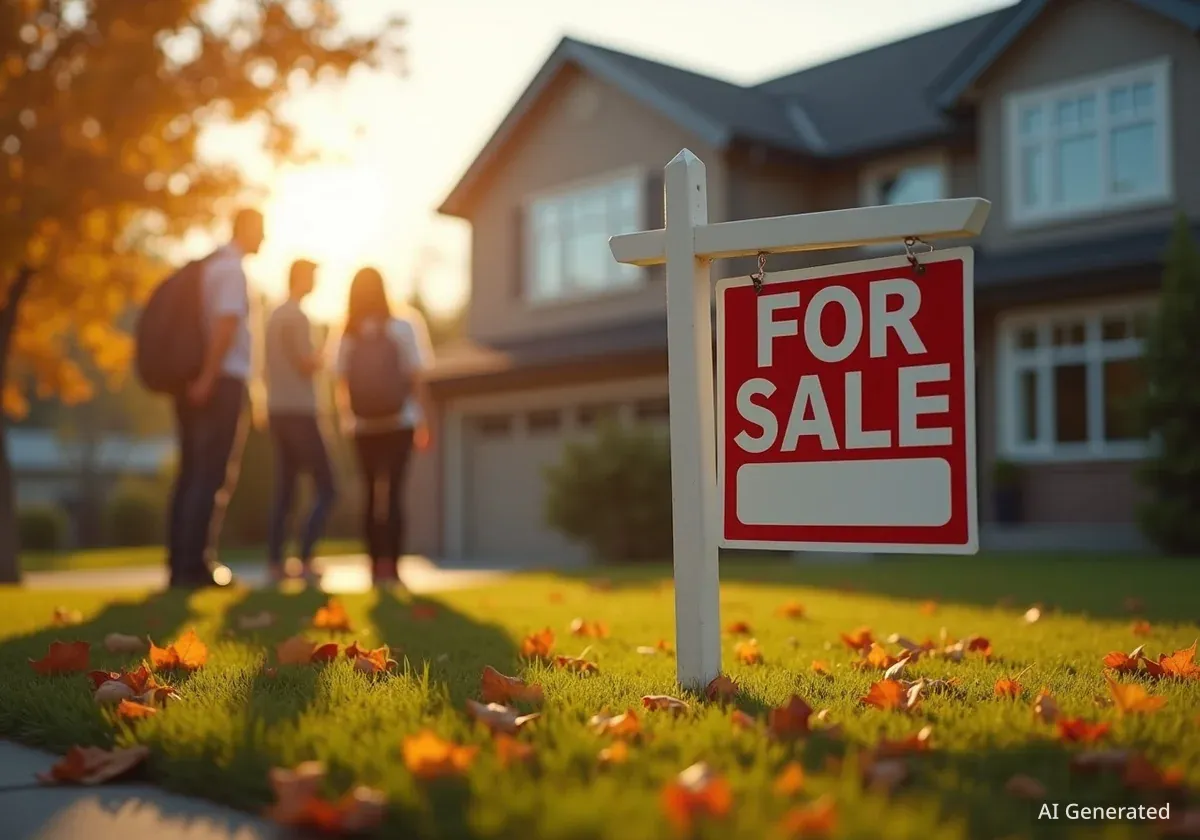The upcoming New York City mayoral election on November 4 is influencing the regional real estate market, with a notable increase in city residents exploring homes in nearby suburbs. Real estate agents in Westchester County report a direct link between the political landscape and rising buyer inquiries, a trend some are calling the “Mamdani effect.”
This shift is attributed to the housing and tax policies proposed by Zohran Mamdani, the Democratic Socialist candidate leading in the polls. Since his primary victory in June, sales contracts in Westchester have climbed 15% compared to the same period last year, signaling a potential migration of higher-income earners from the city.
Key Takeaways
- Real estate agents in Westchester County report a 15% increase in sales contracts since Zohran Mamdani's primary win in June.
- Mamdani's proposed policies include a new 2% tax on incomes over $1 million and a $100 billion investment in affordable housing.
- Many potential buyers from New York City cite concerns over higher taxes and safety as primary reasons for considering a move to the suburbs.
- Westchester offers a tax advantage, as most of its towns do not have a local resident income tax, unlike New York City.
The 'Mamdani Effect' on Suburban Real Estate
Real estate professionals in the suburbs north of New York City are observing a significant change in buyer behavior. Zach and Heather Harrison, who lead The Harrison Team at Compass, have been at the forefront of this trend, fielding a growing number of calls from Manhattan residents.
They confirm a direct connection between the political climate and the housing market. "We are absolutely seeing a correlation between Zohran Mamdani’s surprise win in the Democratic primary and an uptick in real estate interest in Westchester," the Harrisons stated.
"Since the summer, nearly every buyer from the city we have taken out to see homes in Westchester has mentioned the mayoral election as one of the drivers for shopping in the suburbs."
This phenomenon, now dubbed the “Mamdani effect” by local agents, suggests that the prospect of a new administration with a different approach to housing and taxation is prompting some city dwellers to reevaluate where they live. The Harrisons added, "The current environment is giving buyers and investors a reason to reconsider their next real estate move, and turning to Westchester as the main attraction."
A Closer Look at the Proposed Policies
Zohran Mamdani's platform includes a comprehensive and ambitious housing plan designed to address New York City's long-standing affordability crisis. Understanding these proposals is key to understanding the reaction from some residents.
Mamdani's Housing and Tax Proposals
The candidate's plan involves a $100 billion investment over the next decade. This funding would support the construction of 200,000 new publicly subsidized, rent-stabilized housing units. The proposal aims to provide relief for working-class and immigrant communities facing high rents.
Key components of the plan include:
- A multiyear rent freeze on all rent-stabilized apartments.
- Doubling the capital budget for the New York City Housing Authority (NYCHA) to maintain public housing.
- Granting "fast-track" status to development projects that are 100% affordable housing to reduce delays.
To fund these initiatives, Mamdani has proposed a new 2% tax on New Yorkers earning more than $1 million annually. His campaign estimates this tax could generate approximately $4 billion per year. The revenue would be directed toward programs like universal early child care and the expansion of affordable housing.
Taxation as a Primary Motivator for Moving
While Mamdani's policies are designed to benefit many New Yorkers, the proposed tax increase is a significant concern for higher earners. According to real estate agents, this financial consideration is the leading factor driving the search for suburban homes.
"I’d say taxes are the No. 1 priority for buyers considering a move to Westchester in light of the mayoral election," Zach Harrison explained. He noted that the rise of remote work has made suburban living more practical for professionals who no longer need to be in a city office five days a week.
Tax Burden Comparison: NYC vs. Westchester
New York City residents pay a city income tax ranging from 3.078% to 3.876%, in addition to state and federal taxes. In contrast, nearly all towns in Westchester County, with the exception of Yonkers, have no local resident income tax. This difference can result in significant annual savings for high-income households.
The combination of potential tax savings, more living space, and community amenities makes the suburbs an attractive alternative. "When you can move toward greater space, community amenities, and affordability that the suburbs offer, it really becomes an easy decision for most buyers," Harrison said.
National and Local Market Context
The increased activity in New York's suburbs contrasts with a broader national trend of a slowing housing market. According to a Realtor.com report from August 2025, homes in 44 of the 50 largest metropolitan areas took longer to sell compared to the previous year. Only two markets, Kansas City and Buffalo, saw homes selling faster.
In New York City itself, the market showed signs of stability but also tightening supply. The typical price per square foot increased by 0.3% from July, contrary to the national trend of a 1.2% decline. However, the number of new listings dropped by 32.1% from the previous month.
NYC Housing Market Snapshot (August 2025)
- Days on Market: 58 days (slightly faster than the national average of 60 days).
- Active Inventory: 5,981 homes, down 11.1% from July.
- New Listings: 836, down 32.1% from July.
Despite the high cost of living, Westchester County remains a popular destination. The median home list price in the county was $729,999 as of August 2025, significantly higher than the national median of $429,990.
What the Future Holds
The outcome of the November 4 election will likely determine the trajectory of this real estate trend. Some commentators, like Fox News host Sean Hannity, have predicted a "mass exodus" from New York if Mamdani's policies are implemented. While that remains to be seen, the preliminary data indicates a clear reaction from the market.
The Harrisons believe the election is a critical turning point. "According to polls as of this writing, signs point to a Mamdani victory as very likely," they said. "If he doesn't win the election, we would anticipate that the city-to-suburbs market will normalize."
However, if the polls prove correct, the activity they are currently seeing may just be the beginning. "If he does win, we would anticipate a greater surge in activity in the Westchester market, given the early surge we’ve seen well in advance of Election Day," they concluded.





